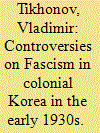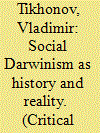|
|
|
Sort Order |
|
|
|
Items / Page
|
|
|
|
|
|
|
| Srl | Item |
| 1 |
ID:
115052


|
|
|
|
|
| Publication |
2012.
|
| Summary/Abstract |
The paper deals with the trends of fascist and fascist-like right-wing social and political thought in colonial Korea in the early 1930s. It shows that in the 1920s, Korea's right wing, its ability to reach out to the masses being severely limited, preferred mostly conciliatory tactics in its relationship with leftist radicals, often making efforts towards inventing 'hybrid' ideologies which would integrate the leftist social concerns into the mainstream religious or nationalist constructions (an example of such a hybrid were various Korean versions of Christian socialism). After the Great Depression, however, Korea's nascent bourgeoisie felt more threatened and became more interested in keeping abreast with right-wing extremist trends in the mother country (Japan) and elsewhere. Such representative ideologists of the Korean propertied class as Yun Ch'iho and Yi Kwangsu were praising Mussolini and employing strong Social Darwinist language in their exhortations to the Korean people to 'regain their vitality and develop [a] spirit of collectivism, obedience and self-sacrifice'. However, until the very end of the 1930s many of Korea's right-wing ideologues remained pronouncedly religious (Yun as Christian, Yi as Buddhist). While highlighting the religious essentials of their worldviews they often abstained from imitating the most extremist traits of European fascist ideologies (for example, anti-Semitism). In many ways, Korea's fascism continued until the end of the 1930s to be an intellectual discourse rather than a mass movement, and retained a strong aura of belonging to more mainstream religious or nationalist traditions.
|
|
|
|
|
|
|
|
|
|
|
|
|
|
|
|
| 2 |
ID:
146633


|
|
|
|
|
| Summary/Abstract |
By the time of Korea’s forced integration into the Japanese Empire in 1910, Social Darwinism was established as the main reference frame for the modernizing intellectual elite. The weak had only themselves to blame for their misfortune, and Korea, if it wished to succeed in collective survival in the modern world’s Darwinist jungles, had to strengthen itself. This mode of thinking was inherited by the right-wing nationalists in the 1920s–1930s; their programs of “national reconstruction” (minjok kaejo) aimed at remaking weak Korea into a “fitter” nation, thus preparing for the eventual independence from the Japanese. At the same time, in the 1920s and 1930s some nationalists appropriated the slogan of solidarity and protection of the weak, nationally and internationally, in the course of their competition against the Left. After liberation from Japanese colonialism in 1945, “competition” mostly referred to inter-state competition in South Korean right-wing discourse. However, the neo-liberal age after the 1997 Asian financial crisis witnessed a new discursive shift, competition-driven society being now the core of the mainstream agenda.
|
|
|
|
|
|
|
|
|
|
|
|
|
|
|
|
|
|
|
|
|